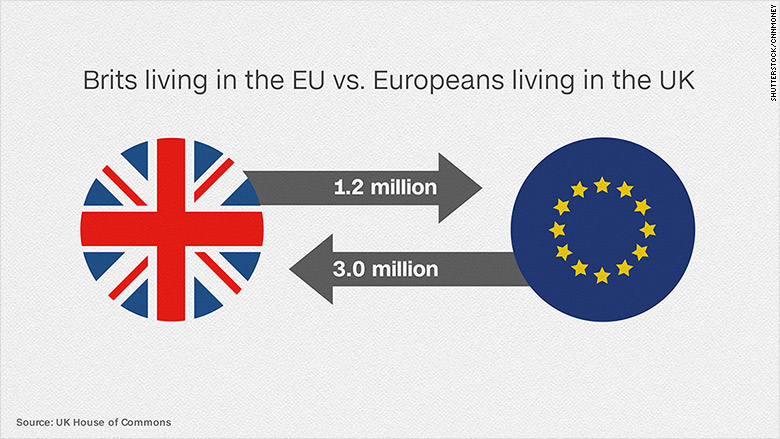
The European Union has warned Britain that pulling out of the bloc will be a painful -- and costly -- process with real consequences.
"Some have created the illusion that Brexit would have no material impact on our lives or that negotiations can be concluded quickly and painlessly," the EU's chief negotiator Michel Barnier said Wednesday. "This is not the case."
Barnier's comments came just hours after the Financial Times reported that Britain could face an upfront payment of up to €100 billion ($109 billion) to leave the EU.
That figure is significantly higher than previous divorce bill estimates, but the newspaper cautioned that the net cost would be reduced over the coming decades by reimbursements from the EU.
The eye-popping number was quickly shot down by U.K. Brexit Secretary David Davis.
"It's gone from €50 billion, to €60 billion to €100 billion," Davis said during a radio interview. "I know that's not where we'll end up."
Related: 5 huge obstacles to an amicable divorce
EU member states pay into a communal budget, which finances infrastructure projects, social programs, scientific research, farm subsidies and pensions for EU bureaucrats. The bloc's budget is negotiated to cover a period of years, with the current agreement extending to 2020.
Negotiators must now determine how much Britain should pay to settle its financial commitments to the EU.
Bruegel, a think tank, has independently calculated that the initial payment by the U.K. could reach €109 billion ($119 billion). However, it estimates the net cost to Britain after repayments would end up between €25 billion ($27 billion) and €65 billion ($71 billion).
"There is no punishment. There is no 'Brexit bill.' The financial settlement is only about settling the account," Barnier told reporters.
Related: Brexit = blackouts? U.K. lawmakers warn nuclear plants may go offline
Prime Minister Theresa May officially triggered Brexit in March, but negotiators still haven't sat down to begin talks.
Even so, fault lines that threaten to derail the discussions have already emerged.
May wants simultaneous negotiations on Britain's exit and a new trading relationship with the remaining 27 members of the EU. She also wants to settle questions over the rights of EU migrants quickly before turning to other issues.
The EU, meanwhile, has made clear that it will not discuss a new trading relationship until other points are agreed. It has included the rights of migrants in its agenda for the first phase of talks, but has pushed back on the idea that a quick agreement is realistic.
"We fail to understand what you can do [on migrant rights] at such an early stage," an EU source told CNNMoney on Wednesday.
Negotiators must establish what will happen to the pensions of millions of people from other EU states who live in the U.K, and which government will foot the bill for their health care and other benefits. If the migrants return to the EU, would their pensions follow?
"All of that is horribly complicated," the source said.
Related: What Brexit will cost Britain

The disagreements have fueled a war of words between EU and British officials.
Divisions burst into the open following a meeting last week between May and European Commission President Jean-Claude Juncker. One report cited EU officials saying that May was in a "different galaxy."
"The mood has soured," the EU source said. "[May] doesn't seem to understand the situation, and sees the world through British glasses."
May, who is in campaign mode ahead of next month's U.K. general election, has responded to chatter by insisting that she plans to be a "bloody difficult woman" during talks with the EU.
On Wednesday, Davis did not rule out the possibility that Britain would end talks without having reached an agreement.
"The simple truth is: This is going to be a tough negotiation," Davis said. "Nobody argues that point."
The EU source said Brussels is hoping that May will adjust her strategy and positions after the general election in the U.K.
And if not? "Houston, we have a problem," the source said.
-- Erin Mclaughlin contributed reporting.


